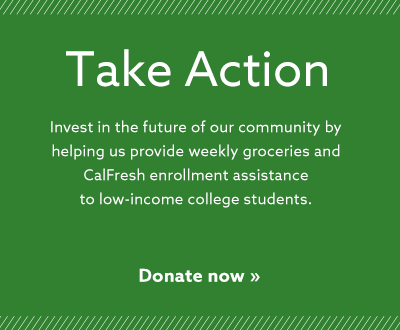You can’t learn when you’re hungry. Yet, as many as 1 in 4 college students who struggle with food insecurity can’t receive CalFresh benefits (food stamps). Our Policy and Advocacy team is working to change this by lobbying Congress to pass the Federal EATS Act.
CalFresh is one of the most important tools for addressing food insecurity and hunger. Recipients can shop for the groceries they want, when they want, by spending their monthly benefits at participating grocery stores and farmers markets. Unfortunately, students from low-income backgrounds are largely unable to access CalFresh because of barriers like a 20 hour/week work requirement. “The work requirement is an archaic rule that requires students to be working hours that they don’t have,” explained Meg Davidson, Director of Policy and Advocacy at the Food Bank.
Eased Restrictions, Increased Participation
The current “work-for-food” rules are based on assumptions of a “typical” college student – upper middle class, with endless free time and family support. In reality, there is no typical student. Between required labs, rotations, and residencies, working to pay their bills, and even supporting families, many students simply don’t have 20 free hours in their week. School is work. Extra barriers to healthy groceries can spell the difference between obtaining a degree and halting their education. The Consolidated Appropriations Act of 2021 got rid of this “work-for-food” rule – temporarily – and the results were immediate. “During the pandemic, restrictions like the work requirement were lifted, and more college students were able to access CalFresh. So, we’ve seen that it doesn’t have to be so hard to get more students in the program,” said Meg.
School is Work
However, expanded CalFresh eligibility for students is set to expire just one month after the federal Public Health Emergency is declared over. That’s where the Federal EATS Act – and you – come into the picture. The Federal EATS Act would permanently expand CalFresh access to low-income students by making attendance at an “institution of higher education” count as their work requirement. “The EATS Act recognizes that school is work,” said Marchon Tatmon, Government Affairs Manager at the Food Bank. “This bill will allow students to access the nutrition they need.” We need your help to make sure all students have access to healthy groceries that fuel their learning. You can sign up for Action Alerts and get involved through our email list: sfmfoodbank.org/advocacy. Let’s urge Congress to pass this permanent legislative fix for college hunger, together.




Share